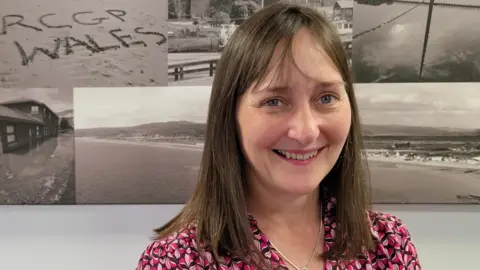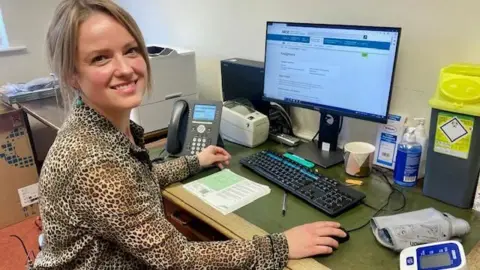Top GP warns NI rise will make waiting times worse
 RCGP
RCGPGP waiting times in Wales will get worse as a result of increases to businesses' National Insurance contributions, a senior doctor has warned.
Dr Rowena Christmas, chairwoman of the Royal College of General Practitioners (RCGP) Wales, said the changes announced by Chancellor Rachel Reeves in the Budget felt like an "absolute crisis" and a "crushing disappointment".
The UK government said it had provided funding to support businesses with NI increases.
But the Welsh government said this was based on England's costs rather than Wales' actual needs and Downing Street had left it with a "significant shortfall".
Unlike other NHS services, GP practices operate as private businesses and are funded by government contracts, which means they are not exempt from the NI increases, which came into effect last month.
GP partners now have to pay NI at 15% on salaries above £5,000 instead of 13.8% on salaries above £9,100.
Monmouthshire-based Dr Christmas said funding cuts, inflation and the rise in the cost of living had made it difficult for GPs to keep going.
"It's hard to be so pessimistic, but this is such a catastrophic situation we suddenly find ourselves in out of nowhere," she said.
She added the new tax rate would cost her practice £20,000 a year, with larger practices facing additional costs of up to £90,000.

In January the BMA's Welsh GP committee voted to accept an updated pay offer, which includes a one-off £23m payment aimed at stabilising practices.
Dr Christmas said the new agreement was "a very welcome relief" but warned it would not solve the long-term challenges and called for GP practices to be exempt from the NI rise.
"If we can't turn that into recurrent funding, we're back to square one or even worse off. It's a temporary breather," she added.
"We all know what's best for patients. But if we're constantly trying to pick up the pieces, we can't do that quality job that we need to that will save the NHS in the long run."
Dr Meleri Evans, an Anglesey GP, said her practice expected to pay between £30,000 and £50,000 more a year.
She said: "This means we're going to have to change the way that we do business and the reality is that the only way that a GP partner can do that is to look at reducing the services they currently provide.
"For the majority of people that comes down to reducing staffing costs. So there are certainly going to be very difficult decisions, including possible redundancies."
In response to the Budget and growing worries within the profession, the British Medical Association's Welsh GP committee entered into negotiations with the Welsh government earlier this year to revise the General Medical Services contract for 2024-25.
The UK government said health was a devolved matter and was an issue for the Welsh government, but added that ministers in Cardiff Bay had received additional funding on top of £21bn for changes in NI for employers.
The Welsh government said: "Our initial estimate is devolved public sector employers in Wales face a £253m extra cost. The approach the UK government is taking leaves us with a significant shortfall."
It added increases should be be fully funded by Westminster and it was pressing the Treasury on this issue.
